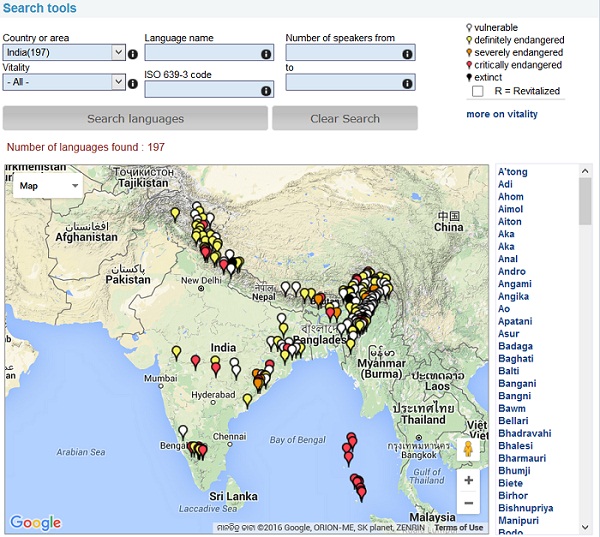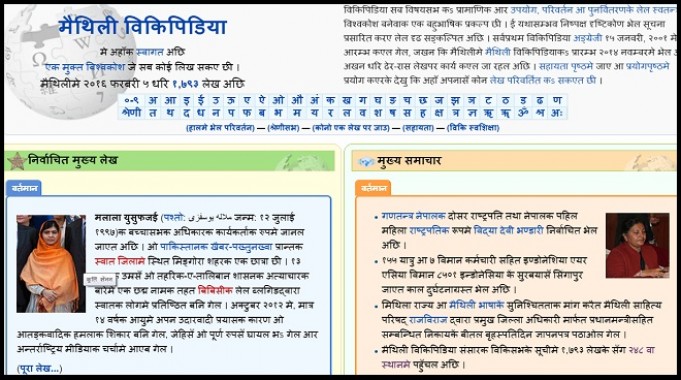Can Wikipedia revive dying Indian languages?
Maithili Wikipedia page
As the world gets ready to celebrate International Mother Language Day on Feb 21, it is important ask whether Wikipedia, the free, multi-lingual online encyclopaedia that turned 15 last month, can play a role in helping not just to save some Indian languages from irrelevance but to inject new energy into them.
Indian languages that made an early entry to the Wiki-world back in 2002 - Assamese, Malayalam, Odia and Punjabi - are helping scale up the representation of Indian languages on the Internet. More languages started being added after these initial ones. Today, there are 23 South Asian language Wikipedia projects including the 20 languages listed in the 8th schedule of the Constitution of India.
Many might not have noticed that the “en” in Wikipedia's URL en.wikipedia.org denotes that the language code of English can be replaced with “or” to visit Odia Wikipedia or “kn” for Kannada Wikipedia.
But the Indian language Wikipedias have a long way to go as compared to many other world languages. There lies a huge gap in the access to knowledge on the Internet. Of 1.26 billion people, only about 15-18% are connected online and that too largely from mobile devices.
Most Wikipedia projects in Indian languages are fairly small but are active and playing an important role. For example, the Tamil and Malayalam Wikipedia communities have played a central part in implementing Wikipedia basics learning in the state-run school syllabus along with many other free software and free knowledge projects to help students learn.
Many Indian languages are in the pipeline to become active Wikipedia projects under the scope of Incubator Wikipedia. Maithili Wikipedia and Goan Konkani Wikipedia are two that have gone live in recent years. There are many more to come and it is certain they will help to ensure that languages do not fade or become irrelevant.

Dying Indian languages mapped over map. Source: UNESCO Interactive Atlas of the World’s Languages in Danger
According to UNESCO, 197 of a total of 1652 Indian languages are dying. Given that there is more and more encyclopedic content in Indian languages, Wikipedia will definitely save some from extinction by bringing more content in varied subject areas, bringing readers to Wikipedia, and attracting more contributors to bring information online in the respective language.
Two other ways that it help keep them alive is, first, the fact that the media uses freely-licensed content from Wikipedia and refers to citations on Wikipedia and secondly, the fact that more Wikipedia content also means more digital activism. Often languages become extinct because of verbal-only usage. That’s where language digital activism can help to keep going. Hebrew, for instance, has risen like a phoenix for this reason.
Apart from Wikipedia, there are many other sister projects (also known as Wikimedia projects) such as Wiktionary, a multilingual dictionary, Wikisource, a free library, Wikimedia Commons, the world’s largest media repository of freely-licensed multimedia files, and Wikidata, a big data project that connects all the Wikimedia projects.
The English Wikipedia has crossed the 5 million article mark. With a population of over 354 million online users, India still has a long way to go in increasing Indian language content on the web. The Government of India's new campaign Digital India aims at digital literacy and the availability of digital resources/services in Indian languages. This is closely aligned with the Wikimedia movement's goal to provide free access to the sum of all human knowledge.
In addition to Wikipedia, many other open educational resources and free knowledge projects that are not already a part of the Digital India campaign signal the need for the government campaign to be more collaborative and open.
Community-government collaborations like the NROER project to make NCERT books under Creative Commons licences and the IT@School project in Kerala to provide education using free and open tools, have gained massive traction and helped more Indian language content come online.
Many of the Malayalam Wikipedia editors in Kerala have worked with the IT@School project to help school children edit and enhance Wikipedia articles and digitise old public domain text. The Wikipedia Education Programme, a global pedagogic programme running in over 87 countries to use Wikipedia as a tool for academic assignment and assessment, has been able to bring a paradigm shift in several languages such as Arabic and Spanish.
(Subhashish Panigrahi is an India-based educator, author, blogger, Wikimedian, language activist and free knowledge evangelist. Follow him at @subhapa on Twitter.)
